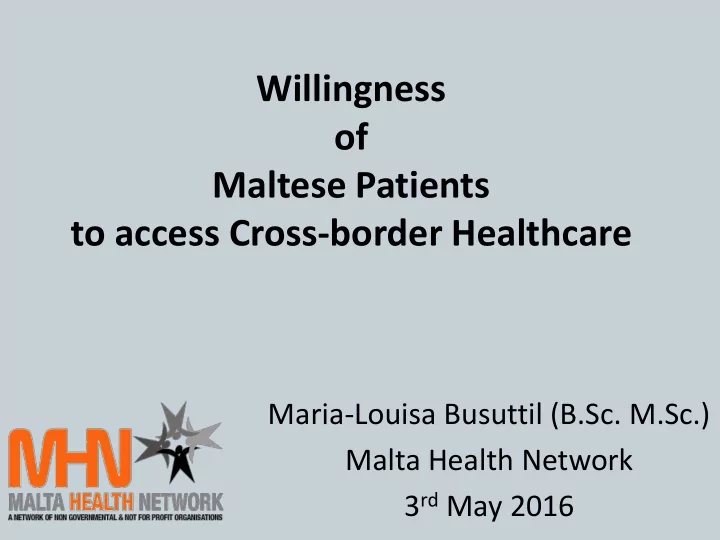

Willingness of Maltese Patients to access Cross-border Healthcare Maria-Louisa Busuttil (B.Sc. M.Sc.) Malta Health Network 3 rd May 2016
Historical Background • 30 year history of cross-border collaboration between Malta and the United Kingdom – Governmental agreement – Specialised care abroad • Directive 2011/24/EU has been implemented in a context where a long standing history of arrangements for cross-border care exists
Conceptual Framework
Methodology • Quantitative cross-sectional study • Survey (Euro-barometer survey) • Patients from the outpatients department of a Maltese public hospital • Sampling procedure – patients that were never exposed to treatment abroad – patients/relatives of patients who did experience treatment abroad
Maltese patients are willing to access cross-border healthcare Mean Willingness: 13.02 (total score 24) SD: 5.304
Factors Influencing Access to Cross-border healthcare Age, education, language literacy, literacy on cross-border healthcare and financial resources were found to have a significant association with willingness to cross-border healthcare
Barriers to access cross-border healthcare • Good quality health service within the domestic health • Payment of transport • Lack of comprehensive information • Fear of the unknown
Agree Eastern 25.7 Europe France 38.4 Germany 48.2 Italy 59.7 United 89.1 Kingdom Percentages
Agree My decision to use cross-border healthcare would be based on 59.4 patients' experiences My decision to use cross-border healthcare would be based on 97.4 recommendations provided by GP/specialist Percentages
Yes the Ministry responsible for health Information sources managed by 87.6 Information provided by specialist 76.2 Information provided by General Practitioner 67.1 Information provided by National Contact Point Information sources that one could 45.0 Information provided by family and friends manage personally 30.4 Information provided by internet 22.5 Information provided by media Percentages
Recommendations • Equipped GPs with relevant information. • Develop the role of National Contact Points. • Educate the public on the differences between specialised care programme and patients’ rights under EU directive. • EU policy should consider focusing on country specific factors to access cross-border healthcare.
Effective Implementation • Recommendations should be context specific • Patients need to be well informed • National Information Campaign – Explain difference between medical and additional expenses NCP , GPs & – Information on waiting times Specialists – Tools of disseminating information – Interoperable information tools
Conceptual Framework
Thank you
Recommend
More recommend